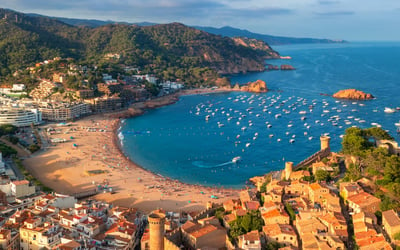Moving to Spain with children means getting to grips with a new school system. From state education to international schools, here’s how to find the right path for your family.
Finding the right school overseas isn’t always easy, but Spain offers families plenty of options that blend academic quality with everyday life. Schooling is compulsory from age six to 16, though many children start at pre-school from age three. You’ll find state schools funded by government, semi-private schools with state support and fully private or international schools offering British, American or IB curricula. Understanding the differences – from admissions and catchment areas to regional languages – will help you settle in quickly and ensure your children thrive both academically and socially.
Download the Spain Buying Guide
Contents
- Overview of the Spanish education system
- School stages and ages
- Language of instruction
- School day and academic year
- School types at a glance
- Secondary, bachillerato and vocational routes
- International schools
- Admissions and enrolment basics
- FAQs
Overview of the Spanish education system
Compulsory education in Spain runs from ages six to 16, split between primary and secondary education. Many families send their children to preschool and kindergarten between the ages of three to six. Post‑16 options include academic bachillerato and vocational training, both leading to higher education or employment opportunities.
School stages and ages
Spain’s system is consistent nationwide, with administration handled by the autonomous communities:
- Educación infantil (0-5): two cycles; the 3–6 cycle is free and optional
- Educación primaria (6-12): primary education (compulsory)
- Educación Secundaria Obligatoria (ESO) (12-16): lower secondary (compulsory) Successful completion awards the Graduado en ESO
- Bachillerato (16-18): upper secondary, two‑year academic route leading to university entrance exams (EBAU) or Formación Profesional (FP) vocational routes
Language of instruction
Many schools teach in Spanish (Castilian), however, in regions with co‑official languages, teaching may be wholly or partly in regional languages like Catalan, Valencian, Galician or Basque.
School day and academic year
Timetables vary by autonomous community and by school. The year typically runs from September to June, with breaks at Christmas and Easter. Exact holiday dates are set regionally.
School types at a glance
The three main categories you’ll encounter are:
| Type | Language & curriculum | Fees & admissions |
|---|---|---|
| State (público) | Spanish and/or co‑official regional language; national curriculum | Tuition free during compulsory years; catchment typically applies; families usually buy books/materials |
| Concertado (state‑funded private) | Spanish and/or regional language; follows the national curriculum | Partly state‑funded; parental contributions common; admissions policies set locally |
| Private/international | Often British, American, IB or bilingual programmes | Fees payable; independent admissions and waiting lists in popular areas |
Secondary, bachillerato and vocational routes
After ESO, students choose between the bachillerato (two years, academically focused, leading to university entrance) or vocational training cycles (FP), which offer direct routes into work or higher vocational study.
International schools
International schools are concentrated in major cities and on the costas. Many offer the British curriculum or the International Baccalaureate. If you want your child to integrate locally while keeping continuity in English‑medium learning, these schools can be a good fit. Compare curricula, accreditation and university destinations when creating your shortlist.
Admissions and enrolment basics
For a state or concertado place you’ll usually apply through your autonomous community’s portal during the admissions window. Practical paperwork typically includes proof of address (empadronamiento), ID for the child and parents (passport/NIE), and vaccination records. Exact requirements vary by region. Catchment areas matter, so it’s a good idea to shortlist schools before you choose where to buy.
Talk to a Spain property expert
FAQs
Is education free for children in Spain?
Tuition in state schools is free for compulsory education (ages six to 16). Families normally cover the cost of books, lunch and extracurricular activities.
Can British children go to school in Spain?
Yes. Resident families can enrol in state or concertado schools, with places allocated by catchment and regional rules. Be ready with your empadronamiento, ID and vaccination records.
Is the education system in Spain good?
International assessments place Spain around the OECD average overall. In PISA 2022, Spain’s 15‑year‑olds scored 473 in maths, 474 in reading and 485 in science, broadly in line with OECD averages.
You might also like:




